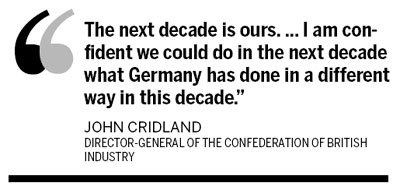UK needs to win export orders in developing economies
Updated: 2011-11-22 10:07
By Zhang Haizhou (China Daily)
|
|||||||||
LONDON - Only 2 percent of the UK's total exports from 2000 to 2010 went to China, according to a report released on Monday that claims Britain needs to reorient its exports toward emerging economies.
|
|
From 2000 to 2010, the UK's share of global exports fell from 5.3 percent to 4.1 percent, while Germany's share increased from 8.9 percent to 9.3 percent, according to the joint report by the Confederation of British Industry (CBI) and Ernst & Young LLP.
Just 4 percent of the UK's exports go to Brazil, Russia, India and China (BRIC) combined - behind much smaller economies such as the Netherlands (7 percent) and Ireland (6 percent), it said, noting that 43 percent of British exports go to eurozone countries.
The report calls for UK exports to the BRIC economies to grow by more than 11 percent on average by 2020.
"Demand in the last decade from the BRIC (economies) has been for manufacturing goods, including machinery, tools and equipment, but in many cases UK companies haven't been strongly positioned enough to compete globally to win this business," commented Steve Varley, Ernst & Young's UK and Ireland managing partner.
The UK has not been able to match its export output to the demands of the BRIC economies. A good example of this is machinery and transport equipment - which account for a large portion of the BRIC countries' imports - and has been the foundation for Germany's success in penetrating these markets.
The International Monetary Fund predicts GDP growth will average 9.4 percent in China and 8.0 percent in India through 2016, against just 2.8 percent in the US and 1.4 percent in Germany - the UK's traditionally favored export markets.
China signed $4.3 billion worth of trade deals with the UK during Premier Wen Jiabao's visit in late June.
During the same European trip, he signed $15 billion in trade deals in Germany, including an agreement between Airbus SAS and China Aviation Supplies Holdings Co for delivery of 88 A320 planes with a list price of $7.5 billion.
But John Cridland, CBI director-general, said that UK exporters will have opportunities in the high-growth markets, where a rising middle class is looking for more "consuming goods and services".
"Over the last decade, Germany has outperformed us in selling manufactured capital goods to countries like China," said Cridland.
"The next decade is ours. I am confident we could do in the next decade what Germany has done in a different way in this decade," said Cridland. He singled out construction services, communication services, electronics, optical and high-technology goods and financial services as "areas with high export growth potential" in the next decade.
If these sectors successfully tap into demand from high-growth economies, then GDP could be boosted by 1.5 percent, or 20 billion pounds ($31.31 billion), by 2020, he added.
"We must find export markets in order to boost our economy, and China is the most important one," said Kerry Brown, head of the Asia Program at the UK think tank Chatham House.
But the difficulty is that China "doesn't seem to want too much to buy" what the UK is trying to sell, Brown said.
"The UK wants the most to export its financial services, which are not quite mature in China. Maybe they'll want them in the future," he added.












